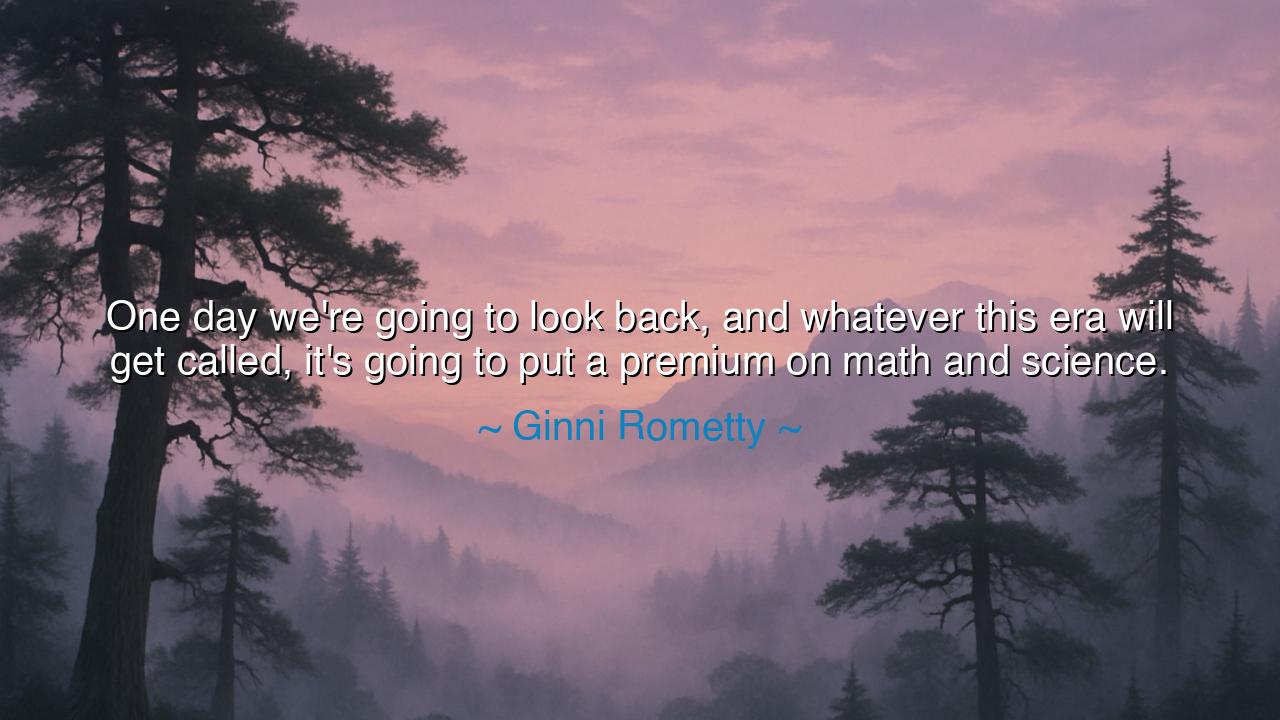
One day we're going to look back, and whatever this era will get
One day we're going to look back, and whatever this era will get called, it's going to put a premium on math and science.






"One day we're going to look back, and whatever this era will get called, it's going to put a premium on math and science." These prophetic words from Ginni Rometty speak to the unfolding significance of math and science in shaping the future of humanity. Rometty suggests that the current era, when viewed through the lens of history, will be remembered as a time when science and mathematics became not merely academic pursuits, but the very foundation upon which the future was built. In the age we live in, where technology advances at a pace once unimaginable, the value of scientific and mathematical knowledge grows ever more apparent. The age of discovery, where these disciplines once held intellectual curiosity as their primary function, now demands them as tools to create, innovate, and transform the world.
In the ancient world, there was no distinction between science and philosophy. The early Greeks believed that the pursuit of knowledge was the highest of callings. Pythagoras, with his mystical understanding of mathematics, saw numbers as the key to understanding the cosmos, and Aristotle sought to understand the laws that governed nature through reason and empirical observation. In the golden age of Athens, intellectuals revered both mathematics and science, understanding that to master the natural world required not only intellectual rigor but a deeper spiritual connection to the forces of the universe. These thinkers laid the groundwork for what Rometty sees as the eventual premium placed on math and science—a legacy that transcends time and guides the advancement of civilization.
In the modern world, we have witnessed the ascension of science and math to unprecedented prominence. The work of Isaac Newton in the 17th century demonstrated how the laws of nature could be quantified through mathematics, propelling the Enlightenment and the Scientific Revolution. Newton's Principia Mathematica established the foundation for classical physics and helped unlock the secrets of the universe. The technological revolution that followed in the 19th and 20th centuries—embodied by figures like Nikola Tesla, Marie Curie, and Albert Einstein—demonstrated the practical application of these principles, turning theory into life-changing inventions that propelled humanity into an era of unprecedented progress.
Consider the Apollo 11 mission, which took humankind to the moon in 1969. This monumental achievement was not only the triumph of engineering, but a testament to the power of mathematics and science in turning dreams into reality. The thousands of equations that guided the spacecraft, the precise calculations of speed, distance, and fuel, were built on the work of countless scientists and mathematicians over centuries. The moon landing marked the culmination of centuries of intellectual labor, proving that when science and math are applied with vision, humanity can transcend the limitations of the Earth and reach for the stars. This was a defining moment that set the stage for future generations, where knowledge of science and math would be crucial for overcoming the challenges of the modern world.
Rometty’s words remind us that we stand at a threshold, where the value of math and science is becoming increasingly central to all aspects of human life. As we face challenges such as climate change, the global economy, healthcare, and the exploration of space, the need for a deep understanding of these disciplines has never been more urgent. The innovations of today—from artificial intelligence to genetic engineering—are rooted in these fields, and it is those who grasp the power of math and science who will guide the future. The world of the future will demand a premium on these fields not just because they provide practical tools, but because they hold the key to unlocking the vast potential of humanity.
The lesson here is both profound and urgent. To thrive in the future, we must embrace the tools of science and mathematics—not as abstract concepts, but as the very foundation upon which the next era will be built. We must encourage the pursuit of these disciplines, not only in classrooms but in every aspect of society. Whether you are a young person choosing a career path, an educator guiding students, or a leader shaping policies, you must recognize that the future will be shaped by those who understand math and science. These fields are not just for the few, but for all who wish to contribute to a world that solves its most pressing problems and unlocks its greatest potential.
Thus, as we move forward into the future, let us take Rometty’s words to heart. We must celebrate the power of math and science as tools of liberation, progress, and understanding. Just as the great minds of the past harnessed these disciplines to unlock the secrets of the universe, so too must we. Let us honor the legacy of those who have laid the groundwork for us, and, in turn, ensure that we leave a legacy of discovery and progress for those who follow. The future will indeed place a premium on these fields, and it is up to us to make sure that the world of tomorrow is one that values knowledge, creativity, and the boundless potential of the human mind.






AAdministratorAdministrator
Welcome, honored guests. Please leave a comment, we will respond soon